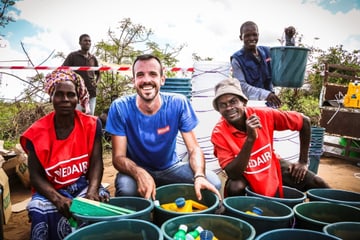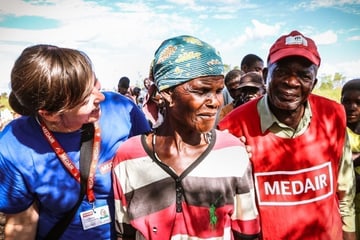Medair: "Our Diversity and Inclusion journey"
During the Forum cinfo 2021, Medair held a session to discuss their organisational journey towards integrating Diversity and Inclusion as a strategic objective. This story recounts the events leading up to this decision, and gives practical examples of actions which can be taken to promote Diversity and Inclusion.

This article is based on the session about the importance of Diversity and Inclusion for a humanitarian organisation, which was presented by Medair at the Forum cinfo 2022. Medair's journey towards a strategic focus on Diversity and Inclusion includes the following steps:
- Take action to realise lack of understanding, address blind spots and recognise the need for education
- Internal and external communication confirming commitment
- Hosting staff events around racism and inequality, such as listening sessions and trainings
- Establishment of voluntary D&I working group with several sub-groups
The wake-up call
Our Diversity and Inclusion (D&I) journey began a quiet Thursday afternoon in late May 2020, during our weekly Town Hall meeting. It was just days after the tragic death of George Floyd. Anti-racism protests were happening all over the world, and institutions, businesses, and humanitarian organisations just like ours were releasing statements on social media confirming their commitment to fighting racism.
In the middle of the Town Hall meeting, one of our colleagues put up their hand. “Everyone else is posting about anti-racism,” they told our senior leadership team. “Why is Medair quiet?”
That question sparked an awakening. Until that point, we had been quiet because we aren’t an advocacy organisation – but by staying silent, we unintentionally sent a message to our colleagues and the people we serve that Medair didn’t care about what happened to people of colour. It was a critical error on our part and couldn’t be further from the truth. We immediately took action to realise our lack of understanding, address our blind spots, and recognise the need for education.
Within hours of that meeting, we had messages on our social media channels confirming our commitment to ending racism. As a faith-based organisation, we spent the following days and weeks praying, reflecting on, and hosting staff events around racism and inequality. We organised listening sessions to allow our colleagues to talk about times when they had experienced or witnessed racism. It became clear from those sessions that we had to be intentional about learning what we needed to do differently as an organisation.
We immediately took action to realise our lack of understanding, address our blind spots, and recognise the need for education.
Diversity & Inclusion as strategic objective
We started by making our commitment to D&I one of our organisation’s strategic objectives, a move that was swiftly approved by our International Board of Trustees. We ran trainings across the organisation that focused on capacity building to understand, recognise, and address racial and implicit bias. We encouraged our teams to think introspectively about racial biases, how they impact team work and our ability to respond to crises, and how they must be addressed.
We also created a voluntary D&I working group made up colleagues from the countries where we work, staff members at our global support and affiliate offices, senior leadership, and alumni. Within that D&I working group, we established three subgroups:
- a listening group to hear from people who have experienced discrimination and facilitate support;
- a policy group to inform, draft, and advise on anti-discrimination and anti-racism policies;
- and a communications group, who created a newsletter recommending training, articles, books, and personal stories for our colleagues.
Engaging our staff
In July 2021, one year after our efforts began, we held our first D&I month. Activities were planned throughout the month to facilitate discussions about recognising bias and racism, including virtual movie reviews, Lunch ‘n’ Learn events, a book club, and dedicated spiritual reflections and sessions at our Town Hall meetings. During this time, we also ran our annual Medair Values survey among our staff teams, and included questions about Diversity and Inclusion. While we had included these questions on our 2020 survey, engagement was relatively low; of our staff who responded to the survey, only 20 percent chose to respond to the D&I questions.

In 2021, engagement had increased and noticeable improvements could be seen when compared to the 2020 results. It was a positive and rewarding start after a year of working hard to recognise and address bias. A key outcome of this D&I month was the creation of a fourth subgroup, the Country Programme Support group, to ensure that the needs of our country programmes are represented well within the D&I working group and that country programmes staff and leadership have the resources and support they need when it comes to promoting Diversity and Inclusion and stamping out racial and ethnic discrimination.
It was a positive and rewarding start after a year of working hard to recognise and address bias.
A journey to be continued
Our work, of course, is not over. We don’t have all the answers, and our efforts to fight racism and address bias within our organisation is a continuing journey. In an organisation that is as diverse and multinational as our own, and that is mandated to respond to the most severe humanitarian crises in the world, we must continue working together to be an organisation that has zero tolerance for racial and ethnic discrimination.
We don’t have all the answers, and our efforts to fight racism and address bias within our organisation is a continuing journey.
Only then can we truly uphold the dignity of the people we serve and the people who work with us, and continue to contribute to the efforts in addressing racism across our sector as a whole.


